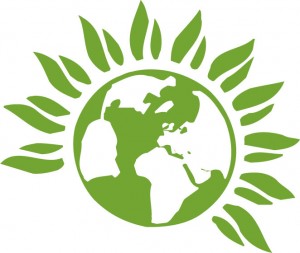Apparently, "In 2005, only 1.3% of the [UK] electorate [44 million] was a member of one of the main political parties", with a few tens of thousands in the smaller parties.
As of today, I'm one of them, having just signed up for the Green Party.
What this will mean in practice, I'm not sure. Being a party member needn't mean more than £2.60 leaving my bank account each month. But hopefully I'll find some way to be involved. (However, joining the Green Party doesn't mean that I hate everything about all of the other parties, or that I will from now on act merely out of tribal loyalty, in case you were wondering!)
I chose the Green Party because I found that its core values resonate with my Christian beliefs. I'll say more about that in a future post. In addition, my personal contact with the Green Party has left good vibes.
In this post I want to indulge in a bit of introspection, and trace out some of my journey towards this point.
I suppose that 10-15 years ago, as a new Christian, my views would have been something like this: the only thing that really matters is hearing the gospel, believing in Jesus, and waiting for Jesus to return (maybe tomorrow). As such, I had no particular inclination to do anything to help tackle the structural problems with the world. In fact, I was very cynical: if Christians put much effort into political issues, then they clearly had their priorities mixed up, and if non-Christians were pushing an agenda for change, then clearly that was contrary to God's will. So I defaulted to a (small-c) conservative position, combined with general indifference and apathy.
So what happened?
- I came to appreciate that everything on this world has significance. This came largely through my contact with L'Abri, first through reading some Schaeffer around 1998, and then, from 2002, through hearing L'Abri speakers giving occasional talks at Calvary Evangelical Church in Brighton, and a couple of stays at the English L'Abri in Hampshire, including a week in the summer of 2006. At L'Abri there is a strong emphasis on the whole of life being under the lordship of Jesus Christ, and that being a created human being with a bodily existence on the earth is a good, significant and meaningful thing.
- I came to appreciate that everything on this world has enduring significance, in other words, that the Christian hope is to spend eternity on the earth (not in heaven), and that there is deep continuity (as well as a discontinuity) between the present age and the age to come. Moreover, I came to appreciate that through Jesus Christ and his resurrection, the age to come has entered the present age, bringing (partial) healing and transformation to this present world. These emphases came largely as a result of reading and listening to things by N.T. Wright, starting in 2005 with What St Paul Really Said.
- I suppose those two factors led me to pay a tiny bit of attention to political matters, and I eventually found myself thinking that politics is important and interesting. My church in Brighton was seeking to serve the local community, and this led to contacts and constructive relationships with people involved in local politics. Being part of that church as we wrestled together with the issue of Christian involvement in politics helped me greatly in shaping my own views. (One friend from that church who was very involved in that is now a Green Party councillor in Brighton.) The 2010 General Election was the first that I really paid much attention to, with stimulating discussions on Tom King's blog, with the help of the Jubilee Centre's Votewise Now! book, and with the Green Party being very strong in Brighton, going on to win their first ever seat in Westminster in the constituency I was living in. Since then, I paid significant attention to the referendum on the Alternative Vote in 2011. And a couple of WYSOCS events in Leeds helped me considerably: a talk on the arms trade by Alan Storkey in October 2010, and a day in March 2011 on The Gospel's Green Light: Motives for Environmental Care.
